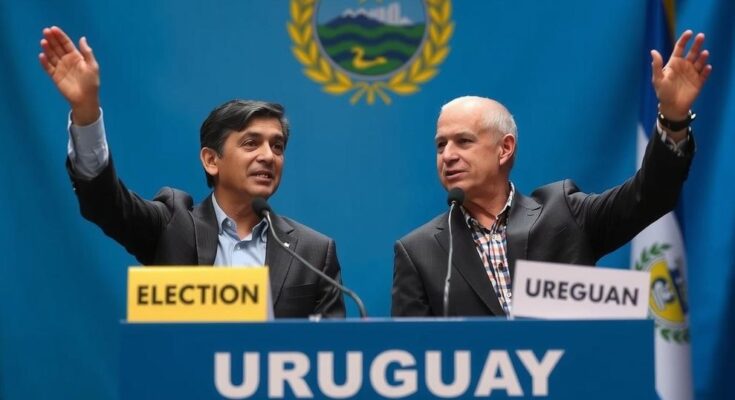Uruguay held a presidential election featuring two moderate candidates—Álvaro Delgado of the conservative coalition and Yamandú Orsi from the center-left alliance—on a backdrop of high voter turnout. A referendum on social security reform dominated discussions, yet the election was marked by civility and broad agreement on key issues. Analysts emphasize the nation’s historical stability amid regional fluctuations in governance.
On Sunday, voters in Uruguay cast their ballots to select a new president amid a competitive election featuring two moderate candidates, reflecting the nation’s historical political stability. The race involved the incumbent conservative coalition and a challenger from the center-left alliance, underscoring Uruguay’s departure from a broader regional trend towards division and democratic instability. Approximately 2.7 million eligible voters participated in this electoral process, which included parliamentary elections and a contentious referendum regarding the social security system. Reports indicated a significant turnout of over 88%, attributable to the country’s compulsory voting regulations, with final results anticipated shortly after polls closed. The social security referendum has garnered considerable media focus, overshadowing other campaign topics such as child poverty, education, and security. While voters are not expecting substantial shifts following the presidential election due to the candidates’ general consensus on key issues, Uruguay continues to be regarded as an exemplary democracy. Political analysts highlighted the calmness of the elections compared to the tumultuous political climate in neighboring countries. The election was characterized by civility, lacking the hostility seen in many other nations, including the United States. The vibrant atmosphere on voting day included festivities along Montevideo’s Rambla, where supporters of various political parties gathered in celebration. Álvaro Delgado, the governing coalition’s candidate, expressed pride in Uruguay’s democratic process after casting his vote. His opponent, Yamandú Orsi, a center-left candidate and former mayor, echoed similar sentiments by emphasizing the decade-long restoration of democratic freedoms. Polls indicated Orsi with a lead yet not sufficient for a decisive victory, suggesting a potential run-off election. He enjoys the endorsement of former President José Mujica, a key figure in Uruguay’s progressive reforms. In the background, Andrés Ojeda, a less traditional candidate, attempted to attract younger voters with his dynamic campaign style. The focus of the electoral debate has been on crime rates and social issues, with the electorate expressing concerns over poverty levels and the education system. An essential element of the electoral process is the proposed changes to the social security system, which has spurred debate regarding Uruguay’s fiscal responsibilities and the distribution of resources. All candidates have voiced their opposition to the referendum, highlighting a significant concern related to its implications on the nation’s economy. As the counting of votes begins, the outcomes of the elections and the referendum stand poised to reshape Uruguay’s political landscape while maintaining its reputation for stability and moderate governance.
The political environment in Uruguay is often viewed as stable and moderate, particularly when contrasted with the more polarized surroundings of Latin America. The nation, with a population of 3.4 million, has a longstanding tradition of democratic governance, carefully navigating political challenges while maintaining social welfare policies. This backdrop creates a unique setting for recent elections, wherein voters are engaged primarily in selecting between candidates who largely agree on numerous policy issues. The context of the electoral process is enhanced by compulsory voting laws, resulting in high voter turnout and a commitment to engaging the electorate in discussions surrounding critically important social issues, such as security, education, and economic stability. The proposed constitutional referendum aimed at social security reform adds complexity, as it intersects with broader regional economic trends and concerns.
In conclusion, Uruguay’s recent presidential election exemplifies the nation’s commitment to political moderation and stability, with a high voter turnout solidifying this principle. The contest between Álvaro Delgado and Yamandú Orsi highlights a political landscape shaped by mutual respect and consensus, diverging from the divisions prevalent in much of the region. The pivotal social security referendum further complicates the electoral context, as it addresses significant economic concerns while challenging traditional norms. Ultimately, the outcome of this election holds the potential to reinforce Uruguay’s enduring democratic values and robust social welfare framework.
Original Source: www.pbs.org




